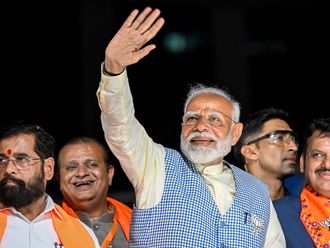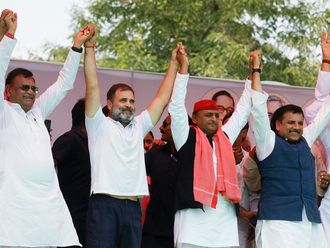Democratic polity in India has been exposed by the Bhopal gas tragedy judgment. There was a nexus between the judiciary, the executive and the bureaucracy. All three joined hands to allow chairman Warren Anderson of Union Carbide, the company that owned the gas plant, escape from India. They also scaled back the compensation and delayed the judgment by 26 years.
This is reminiscent of a decade earlier, when Prime Minister Indira Gandhi undermined democracy on June 25, 1975. Then, too, the bureaucracy and the judiciary fell in line behind the executive. Scant attention was paid to the Constitution. In fact, the organs of state helped to perpetuate tyranny.
On both occasions, Congress was in power. And on both occasions, the prime ministers, Indira Gandhi and her son Rajiv Gandhi, became a law unto themselves and inflicted deep wounds on the democratic structure.
Rajiv Gandhi is said to have told state chief minister Arjun Singh to go easy on Anderson, consulting his Cabinet only after the fact. Similarly, Indira Gandhi imposed a state of emergency independently, consulting her Cabinet afterwards. By the time she did that she had already detained thousands of people without trial. She went even further — she gagged the press. The media have done more than their duty on Bhopal.
But for their campaign, the Congress party headed by Sonia Gandhi, Rajiv Gandhi's wife, would not have been as defensive as it is today.
Indira Gandhi had the Supreme Court uphold by 5 to 1 her imposition of a state of emergency. Former chief justice A.H. Ahmadi sentenced the perpetrators of the Bhopal gas tragedy under section 304-A of the Indian Penal Code, in which the maximum sentence is two years, instead of section 304, in which the maximum sentence is 10 years. Such instances indicate that judges can be manipulated as easily as civil servants. They are afraid to stand up to the government.
The bureaucracy, and officials of the Central Bureau of Investigation in particular, have become too toothless, too obliging, too ready to serve any party that comes to power. Indira Gandhi issued illegal orders and they were obeyed by all civil servants. This is why Jayaprakash Narayan, who led the movement for morality in politics, asked the bureaucracy, the police and the army not to obey illegal orders.
It was comical that the same deputy commissioner and superintendent of police who placed Anderson under arrest escorted him to the airport and saw him flown out on a government plane. Neither lived up to the oath they had taken to uphold the Constitution and the country's integrity. The chief minister's orders had made all the difference.
I have seen similar things happen in Pakistan, Bangladesh, Sri Lanka and Nepal. The ruler counts, not the rules. Ethical considerations no longer factor into the decisions taken by public servants. The will to keep their jobs is all that guides them. They are so fearful that public servants throughout the subcontinent act as willing tools of tyranny.
Those who violate the norms of the democratic system should be held accountable. I have never seen an erring judge, a tainted minister or a delinquent civil servant being punished.
Indira Gandhi was not punished for all the excesses and atrocities she committed during the two-year state of emergency (1975-77). Rajiv Gandhi was not even questioned about Anderson's escape.
It is also not surprising that the dysfunctional US plant was installed at Bhopal during the state of emergency. Any objections were squashed by Sanjay Gandhi.
Scapegoat
Congress has placed all the blame on the then chief minister, also a member of the party. Even if the party is able to deflect the blame — as it did when it came to saving Indira Gandhi — there is something called a value system. True, political parties have substituted it with power. But then they must be prepared to face violent, desperate forces such as the Maoists or the Taliban.
What hurts me is to see that people who were involved in the state of emergency are in the Cabinet. Pranab Mukherjee, Kamal Nath and Ambika Soni, senior ministers of the Manmohan Singh Cabinet, were among those who were instruments in the hands of Sanjay Gandhi, Indira Gandhi's son, during the dark days of the emergency.
Home Minister P. Chidambaram, appointed by the prime minister to oversee the Bhopal gas tragedy, tried, as finance minister, to push through a decision that would absolve Dow Chemicals, which bought Union Carbide, of responsibility. By shouting down every critic, Congress shows the arrogance of power. It must take responsibility and offer apologies to the nation. At the very least, it should compensate the victims. Congress must learn humility.
If India is to preserve the fundamental values of a democratic society, public functionaries and private citizens must display a degree of vigilance and willingness to sacrifice. Without awareness of what is right, there can be no realisation of what is wrong.
Kuldip Nayar is a former Indian High Commissioner to the United Kingdom and a former Rajya Sabha member.










